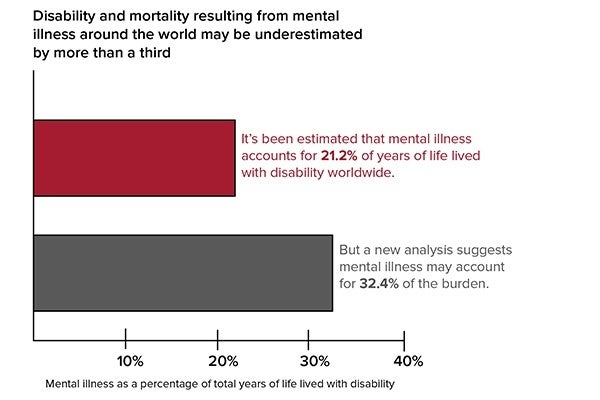The disability and mortality that results from mental illness around the world is underestimated by more than a third, according to researchers from Harvard T.H. Chan School of Public Health and King’s College London.
In an article in the February 2016 issue of The Lancet Psychiatry, the authors estimate that, worldwide, mental illness accounts for 32.4% of years lived with disability (YLDs), and 13% of disability-adjusted life years (DALYs)—a measure of years of healthy life lost due to ill health, disability, or early death. Previous estimates put the global burden of mental illness at 21.2% of YLDs and 7.1% of DALYs, but authors of the new article argue that mental illness has been wrongly measured and categorized in the past.

For instance, suicide and other forms of self-harm were previously considered “injuries” and excluded from calculations of the effect of mental illness. In addition, some chronic pain syndromes such as fibromyalgia and low back pain—most prevalent in patients struggling with mood, anxiety, or stress disorders—have been considered “musculoskeletal conditions,” but the authors say that it would make sense to attribute a proportion of these conditions to mental illness.
According to co-author Daniel Vigo, Centennial Fellow in Harvard Chan School’s Doctor of Public Health program and a psychiatrist, it’s important to accurately quantify the true burden of mental illness because of the individual and societal harm it causes. “People with severe mental illness die before a heavy smoker, just to have a perspective on how serious this is,” he said in a February 5, 2016 Voice of America article.
Vigo added that the problem of underestimation is compounded by stigma, and results in disproportionately low funding that goes to ineffective segregated services for the mentally ill, particularly in low- and middle-income countries and underserved areas.
Rifat Atun, professor of global health systems at Harvard Chan School, was also a co-author.
Read the Voice of America article: Study: Global Mental Illness Widespread, Undercounted
Read the Lancet Psychiatry article: Estimating the true global burden of mental illness